
Pentagon Goes All-In on AI, Awarding Up to $800 Million Military Contract to Google, OpenAI, and Other Tech Giants, Sparking Ethical Alarms
Jul 16, 2025 |
👀 148 views |
💬 0 comments
The U.S. Department of Defense has officially entered the AI arms race, awarding massive contracts worth up to $800 million to a quartet of Silicon Valley's most powerful players: Google, OpenAI, Anthropic, and Elon Musk's xAI. The move signals a major strategic shift, embedding commercial, cutting-edge artificial intelligence directly into the heart of U.S. national security operations.
The Pentagon's Chief Digital and Artificial Intelligence Office (CDAO) announced that each company is eligible for up to $200 million to develop "agentic AI workflows" for a wide range of military applications. This is a clear move to leverage the rapid innovation of the private sector to maintain a "strategic advantage over our adversaries," according to CDAO Chief, Dr. Doug Matty.
The scope of the project is vast, intended to accelerate the use of advanced AI in everything from intelligence analysis and battlefield logistics to back-office business systems. The military aims to integrate these powerful large language models into existing platforms like the Maven Smart System, a program already using AI to analyze drone and satellite imagery to identify potential targets.
This "commercial-first" approach is designed to be agile, creating a competitive environment where the Pentagon can pick and choose the best solutions from the top minds in AI. The deal also streamlines the procurement process, allowing any federal agency to tap into these powerful AI tools through the General Services Administration (GSA).
Almost immediately, the companies involved have begun to pivot towards this lucrative new market. xAI, for instance, announced a new "Grok for Government" suite, and OpenAI and Anthropic have similarly launched government-focused divisions.
However, the landmark deal has also set off a firestorm of ethical debate and resurrected deep-seated anxieties about the role of Big Tech in the machinery of war. Key concerns include:
The Lethality Question: While the Pentagon emphasizes that these AI systems will support human decision-making and not act as autonomous weapon systems, critics argue that the line between data analysis and a "kill chain" is becoming dangerously blurred. AI that can identify targets, even if a human gives the final approval, is a significant step towards greater automation in warfare.
Reliability and Bias: The chatbots developed by these companies, including Grok and others, have been plagued by public instances of generating false, biased, or even offensive content. The prospect of such unreliable systems being used in high-stakes national security scenarios, where a "hallucination" could have catastrophic consequences, is a major point of concern.
Employee and Public Backlash: Google previously withdrew from Project Maven in 2018 after significant employee protests over the ethical implications of their work. This new, much larger deal reopens these old wounds and puts the tech giants in a precarious position, balancing lucrative government contracts against the values of their employees and the public.
For years, a wary truce existed between Silicon Valley's idealistic self-image and the grim realities of military contracting. With this $800 million deal, that truce is officially over. The Pentagon has made its bet, and the world's most powerful AI companies have chosen to go all-in, ushering in a new, and deeply controversial, era of artificial intelligence in defense.
🧠 Related Posts
💬 Leave a Comment
